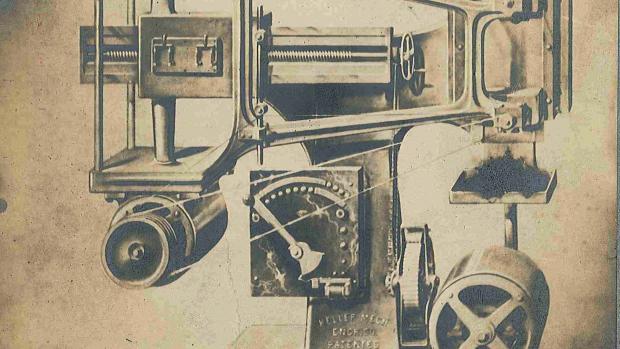Engineers in the Archive
NYU-Poly Students Explore the Complexity of Innovation and Entrepreneurship

Using archival material to gain insight into i2e was the focus of a presentation by Christopher Leslie, instructor of media, science and technology studies at NYU-Poly, last week. As part of Leslie's Science and Technology Studies (STS) Seminar this semester, Polytechnic Institute of New York University (NYU-Poly) students have been using a unique resource created by a NYU-Poly graduate, Richard D. Keller, to study innovation and technology transfer in relation his family's business.
The Keller Mechanical Engineering Co. (KME) was active in the tristate area at the start of the twentieth century, at one time occupying facilities in DUMBO. The family began the business as an engraving company, but their effort to innovate new techniques for the mass production of silverware led to an innovation that would come to be known as the E-1 Automatic Die Cutter. The Kellers sold their first machine in 1915. Soon, companies in Philadelphia, Upstate New York, Detroit, and England were using their tracer-controlled equipment to duplicate molds and dies; the word "Kellering" was coined to describe their technique of producing copies of dies from fragile originals, allowing for the rapid production of new designs for as diverse products as automobile fenders and glass bottles. KME merged with Pratt and Whitney in 1930 and moved to a new facility in Connecticut.
Richard D. Keller, the second generation of Kellers to be involved in the company, graduated from Poly in 1930. His love and interest in the company and its legacy led him to collect and preserve material related to the company. Jane Keller Herzig, the daughter of Richard D. Keller, and her siblings, Peter and James, donated Richard Keller's collection to the Poly Archives and Special Collections in 2007. Lindsay Anderberg, NYU-Poly archivist and user services librarian at NYU-Poly, preserved and processed the collection, a project made possible in part by a grant from the Documentary Heritage Program of the New York State Archives.
Thanks to the generosity of the Keller family, NYU-Poly students have had the opportunity to engage in a hands-on activity that demonstrated to them the opportunity provided to inventors through multidisciplinary collaboration and the challenges companies face in managing technology transfer. After the collection was prepared and ready for use in the Bern Dibner Library of Science and Technology, Anderberg and Leslie designed a series of activities and an assignment that would require use of the archive.
Through the combination of classroom study and archival research, teams of students in the STS Seminar then began to analyze how the history of technology could provide insight into i2e. Peter Keller, a foreign service officer with expertise in intellectual property and technology transfer, and Peter's wife, Minerva, visited NYU-Poly in April to hear the students' preliminary findings on this project. Combining his memories of the family business with their academic training and their work in the archive, the students then created team-based research essays that explored their personal and professional interest, ranging from marketing or patents to interdisciplinary engineering or philosophy.
Leslie was invited to participate in a panel discussion about using archives in the classroom sponsored by the New York chapter of the Association of College and Research Libraries at the New York City College of Technology on April 30. He related that this was the first time that his students had ever been in an archive, which in itself was a valuable educational experience. But also, the project allowed students to think about the difficult process by which history is constructed, and they were pleased to learn about aspects of history that were not available from Wikipedia or other online sources. Working with the archive and trying to understand KME's history also helped them to understand an important insight from STS: linear development narratives are often misleading, and the process of i2e is never as smooth or inevitable as it might seem from hindsight.
The STS Seminar brings together multidisciplinary groups as part of the Science and Technology Studies major in the Department of Technology, Culture and Society.




